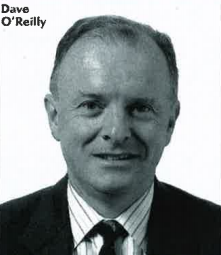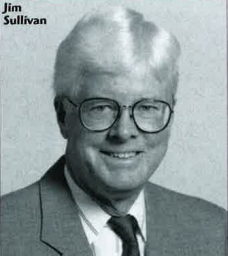When it comes to people in the oil business, the old stereotype is of Texas wildcatters straight out of a scene from Dallas or Arab sheiks from distant desert kingdoms wheeling and dealing around the world.
Yet the face of Chevron Oil, the second-largest U.S. oil company, is undeniably different. The newly elected chairman and chief executive of Chevron, as of January 1, 2000, is 52-year-old Dave O’Reilly, Dublin-born and the son of a department store buyer. One of his two vice chairmen is Jim Sullivan (60), a man so proud of his Irish roots that he was the chief honoree at the American Ireland Fund dinner in San Francisco this year and, more importantly, can discuss the variables in pints of Guinness as they are poured in San Francisco, Dublin or London,
For O’Reilly, the accomplishment of reaching the very top at Chevron is truly a remarkable achievement. He was one of four chemical engineers recruited from Ireland in 1968 by the giant San Francisco-based company and began work as a process engineer. From such unremarkable beginnings he has now ascended to the top of one of the world’s major oil companies.
On announcing his successor, retiring chief executive and chairman Ken Derr said, “Dave O’Reilly is the right person to lead Chevron in the future. He combines broad company experience with a record of achieving superior business results, and he has strong leadership skills.”
According to one wire service report, Derr hand-picked O’Reilly — described by one Wall Street oil analyst as a “personable young aggressive Irishman.”
Indeed, so keen was Derr to have O’Reilly take over that merger talks with Texaco broke down last June reportedly because of a major difference about how the succession issue of the new combined companies would be handled. Derr wanted O’Reilly as his choice to take the helm, while Texaco chief Peter Bijur (56) apparently wanted to run the merged group.
Trained as an engineer, O’Reilly has most recently led the company’s worldwide exploration and production from the vice chairman spot. He also has run Chevron’ s chemical and products divisions.
To hear O’Reilly tell it, there was nothing remarkable in his rise. “I was very fortunate,” he tells me during our interview in his office atop the San Francisco high-rise which houses Chevron’s headquarters. “I managed to get significant management experience fairly early in my career, which also gave me an opportunity to learn the business side.”
He says he gained important insights into the crucial international market when he was heavily involved in monitoring foreign operations owned by Chevron in Asia and the Middle East. “This is a complex business,” he says, “and I have been lucky in experiencing many of the different facets of it.”
Like many successful Irish executives, O’Reilly also points to communication skills as crucial for any successful executive. “It’s a cliché, but how you deal with people does make the difference,” says O’Reilly, who was in charge of human resources as part of his vice chairman duties. “This business is more than about balance sheets, it’s about the capability and the ability of people you work with to make a difference.”
Originally from Ballsbridge in south Dublin, O’Reilly was one of five children. His father was a menswear buyer for Arnott’s, one of Dublin’s largest department stores. He attended Blackrock College and graduated from University College Dublin with a degree in chemical engineering.
Soon after, Chevron came calling and he and three other engineers decided to try life in California. O’Reilly fit in right away, loving the lifestyle and the corporate culture. His three other fellow engineers have since returned to Ireland.
O’Reilly’s first major promotion was when he was named general manager of Chevron’s refinery in El Segundo, California in 1986 and from there it was a rapid series of steps to being named vice chairman in November 1998 and now chairman and chief executive.
He is taking the helm at an enormously important time for energy companies. As an example, he cites the fact that the Internet and computers now takes up 14 percent of all electric power, up from just 4 percent a few years back. The point is that Silicon Valley in this information age is not marginalizing energy, quite the opposite. “You can’t disconnect the role of energy in the economy,” he says. “The energy business is anything but a mature industry.”
O’Reilly sees international expansion as the way of the future. The Tengiz joint venture in Kazakhstan, which now produces 220,000 barrels of oil a day, will likely triple production over the next decade. In recent times the company has also re-entered Venezuela, Kuwait, Saudi Arabia and Bahrain.
The oil business is subject to great volatility, as O’Reilly ruefully admits. Political instability and currency fluctuations are just two of the major headaches that any global oil company has to deal with. Yet he believes there are major opportunities ahead with technological advances coming in burning cleaner fuel and in improved ability to extract energy resources.
Jim Sullivan would go along with that. A San Francisco native, he is almost 40 years with Chevron, after starting with them in 1961. Previously he had worked with Monsanto, but when they were about to transfer him to a place called Chocolate Bayou, Texas, Jim decided a return to his Bay Area roots was a wiser move.
As vice chairman at Chevron he has had a particular interest in environmental affairs and was responsible for Chevron’s booklet “Protecting People and the Environment,” which has become a model for how oil companies can handle this thorny issue.
Both Sullivan and O’Reilly believe that oil companies get a bad rap when it comes to this issue. “Oil companies are a popular target,” says Sullivan. “I feel we haven’t done enough to tell our side of the story. The fact is we are all very dependent on transportation fuels and it is taken for granted that the efficiency of the oil companies in keeping the costs low will always be there. Telling our story and the vital role that we play is very important.”
Sullivan points to the major role that oil companies are playing in securing cleaner forms of energy for the future and the immense research that is being done.
“It is not pie in the sky to say that gasoline may be replaced,” he says. “There are significant improvements in the internal combustion engine that will allow it to burn much cleaner and produce less emission.”
 He believes that fuel cells, very much the buzzwords of his industry, may be in the marketplace within a 20-year period as technological advances make it easier to convert fuels. However, he does not believe oil itself will be replaced, as there will still be a need for hydrocarbons.
He believes that fuel cells, very much the buzzwords of his industry, may be in the marketplace within a 20-year period as technological advances make it easier to convert fuels. However, he does not believe oil itself will be replaced, as there will still be a need for hydrocarbons.
Sullivan has also had responsibility for the Y2K planning at Chevron. Indeed, he intends to spend the great night ushering in the new millennium with co-workers at a Chevron plant.
The specter of long gas lines hyped in some media reports is not one that bothers him, as he knows that the industry has prepared for that. The only downside, he believes, would be an “imaginary problem” where consumers would believe much of the doomsday hype and begin to stock up on gasoline supplies before the end of the millennium, thereby causing a shortage.
Sullivan is a man who has stayed very close to his Irish roots. He has been to Ireland a half dozen times and is planning a future major vacation there. He originally went, he says, to “put his foot on the soil” of where his family on both sides had come from. He knows his mother’s side more than his father’s because of his close childhood connection with his maternal grandfather James Brown, a retired machinist from County Monaghan.
“He was a strong and loving gentleman and I have very fond memories of him,” says Sullivan. “He was short, stocky and had that typically infectious smile. As a little kid I’ll never forget the way he’d scoop me up in his arms.”
From his grandfather he learned many of the stories of Ireland’s rich history. Years later, when he finally landed there, he felt an immediate kinship with the land.
Unfortunately, with a name like Sullivan and a county of ancestry in Cork where every second household is a Sullivan, he has not been able to get as close to his paternal roots. His favorite sight in Ireland, he says, is Bally-bunion golf course which he ranks among the best in the world.
An affable man, Sullivan is a raconteur who can tell stories about his many trips to Ireland and characters he met there with verve and wit. His success at Chevron he attributes in part to his communication skills and, indeed, he believes that one of the key leadership skills is the ability to remain keenly interested in other people.
This year Jim Sullivan was honored by the American Ireland Fund with their “Distinguished Leadership Award” at their San Francisco dinner. Judging by the thick dinner journal produced for the occasion, it was a very popular choice. Jim Sullivan and Dave O’Reilly are clearly two executives who exemplify the best of Irish American business.♦


Leave a Reply